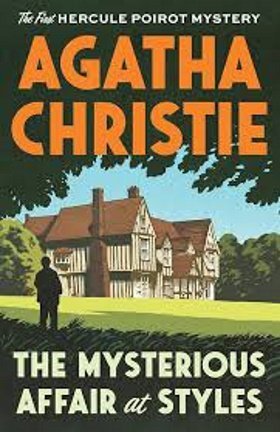“Only her powders?”
The flush deepened as Cynthia replied:
“Oh, yes, I did make up some sleeping powders for her once.”
“These?”
Poirot produced the empty box which had contained powders.
She nodded.
“Can you tell me what they were? Sulphonal? Veronal?”
“No, they were bromide powders.”
“Ah! Thank you, mademoiselle; good morning.”
As we walked briskly away from the house, I glanced at him more than once. I had often before noticed that, if anything excited him, his eyes turned green like a cat’s. They were shining like emeralds now.
“My friend,” he broke out at last, “I have a little idea, a very strange, and probably utterly impossible idea. And yet—it fits in.”
I shrugged my shoulders. I privately thought that Poirot was rather too much given to these fantastic ideas. In this case, surely, the truth was only too plain and apparent.
“So that is the explanation of the blank label on the box,” I remarked. “Very simple, as you said. I really wonder that I did not think of it myself.”
Poirot did not appear to be listening to me.
“They have made one more discovery, là-bas,” he observed, jerking his thumb over his shoulder in the direction of Styles. “Mr. Wells told me as we were going upstairs.”
“What was it?”
“Locked up in the desk in the boudoir, they found a will of Mrs. Inglethorp’s, dated before her marriage, leaving her fortune to Alfred Inglethorp. It must have been made just at the time they were engaged. It came quite as a surprise to Wells—and to John Cavendish also. It was written on one of those printed will forms, and witnessed by two of the servants—not Dorcas.”
“Did Mr. Inglethorp know of it?”
“He says not.”
“One might take that with a grain of salt,” I remarked sceptically. “All these wills are very confusing. Tell me, how did those scribbled words on the envelope help you to discover that a will was made yesterday afternoon?”
Poirot smiled.
“Mon ami, have you ever, when writing a letter, been arrested by the fact that you did not know how to spell a certain word?”
“Yes, often. I suppose everyone has.”
“Exactly. And have you not, in such a case, tried the word once or twice on the edge of the blotting-paper, or a spare scrap of paper, to see if it looked right? Well, that is what Mrs. Inglethorp did. You will notice that the word ‘possessed’ is spelt first with one ‘s’ and subsequently with two—correctly. To make sure, she had further tried it in a sentence, thus: ‘I am possessed.’ Now, what did that tell me? It told me that Mrs. Inglethorp had been writing the word ‘possessed’ that afternoon, and, having the fragment of paper found in the grate fresh in my mind, the possibility of a will—(a document almost certain to contain that word)—occurred to me at once. This possibility was confirmed by a further circumstance. In the general confusion, the boudoir had not been swept that morning, and near the desk were several traces of brown mould and earth. The weather had been perfectly fine for some days, and no ordinary boots would have left such a heavy deposit.
“I strolled to the window, and saw at once that the begonia beds had been newly planted. The mould in the beds was exactly similar to that on the floor of the boudoir, and also I learnt from you that they had been planted yesterday afternoon. I was now sure that one, or possibly both of the gardeners—for there were two sets of footprints in the bed—had entered the boudoir, for if Mrs. Inglethorp had merely wished to speak to them she would in all probability have stood at the window, and they would not have come into the room at all. I was now quite convinced that she had made a fresh will, and had called the two gardeners in to witness her signature. Events proved that I was right in my supposition.”
“That was very ingenious,” I could not help admitting. “I must confess that the conclusions I drew from those few scribbled words were quite erroneous.”
He smiled.
“You gave too much rein to your imagination. Imagination is a good servant, and a bad master. The simplest explanation is always the most likely.”
“Another point—how did you know that the key of the despatch-case had been lost?”
“I did not know it. It was a guess that turned out to be correct. You observed that it had a piece of twisted wire through the handle. That suggested to me at once that it had possibly been wrenched off a flimsy key-ring. Now, if it had been lost and recovered, Mrs. Inglethorp would at once have replaced it on her bunch; but on her bunch I found what was obviously the duplicate key, very new and bright, which led me to the hypothesis that somebody else had inserted the original key in the lock of the despatch-case.”
“Yes,” I said, “Alfred Inglethorp, without doubt.”
Poirot looked at me curiously.
“You are very sure of his guilt?”
“Well, naturally. Every fresh circumstance seems to establish it more clearly.”
“On the contrary,” said Poirot quietly, “there are several points in his favour.”
“Oh, come now!”
“Yes.”
“I see only one.”
“And that?”
“That he was not in the house last night.”

























